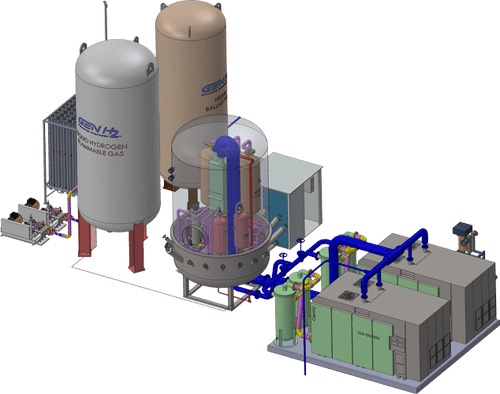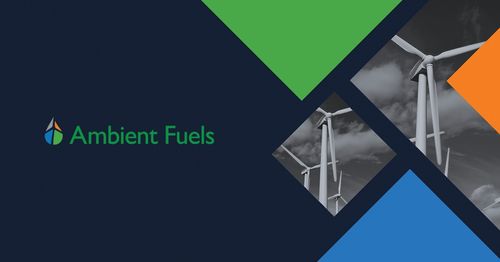Several regional hydrogen hub teams, made up of private and public sector partnerships, have announced that the Department of Energy has encouraged them to submit full applications to the regional clean hydrogen hub Funding Opportunity Announcement.
According to the DOE, 33 of 79 initial applicants were encouraged to submit full applications, which are due April 7. The agency is not planning to publish a list regarding which teams were encouraged or discouraged, but applicants are allowed to publicize the results if they choose.
The DOE has said it expects to review and select six to 10 of the full applications for federal funding estimated at around $1bn per hub. The funding is designated in the Infrastructure Investment and Jobs Act.
Those hubs that have made public announcements of initial encouragement, or have indicated they would continue to compete for funding, are:
Appalachian Regional Clean Hydrogen Hub (ARCH2)
ARCH2 was formed through a partnership with the State of West Virginia, EQT Corporation, Battelle and GTI Energy, and Allegheny Science & Technology (AST). The hub is expected to be centered in West Virginia and stretch into Ohio, Pennsylvania and Kentucky. The region is the ideal location for a clean hydrogen hub, the partners say, due to its unique access to ample low-cost natural gas feedstock, end-user demand, workforce and technology capability, and carbon sequestration potential.
Great Lakes Clean Hydrogen Coalition
This coalition is led by Linde, Energy Harbor,Cleveland-Cliffs, GE Aerospace and the University of Toledo, along with the Glass Manufacturing Industry Council (GMIC). GLCH has proposed to develop low-carbon hydrogen via electrolysis based in Oak Harbor, Ohio at the Davis-Besse Nuclear Power Station. The facility proposes to distribute the hydrogen across the Great Lakes region by pipeline and road transportation.
Western Interstate Hydrogen Hub
This interstate coalition between Colorado, New Mexico, Wyoming, and Utah contracts with Atkins Nuclear Solutions and includes regional utilities. The group is proposing to build eight major hydrogen projects that will replace coal-fired power plants and supply a mix of hydrogen and natural gas to local communities and for transportation. The projects would generate 1,000 MT/day by year 7 and scale up to about 1,900 MT/day by year 12.
Hawaii Pacific Hydrogen Hub
This state-based consortium is led by the Hawai‘i State Energy Office and includes representatives from Enso Infrastructure, Dibshawaii, Cyrq Energy and Hawai’i Gas, among others. Very little information has been made public about this proposal.
HALO Hydrogen Hub
This three-state partnership between Arkansas, Louisiana and Oklahoma includes stakeholders Shell, Air Products, Baker Hughes and the Cherokee Nation. The HALO Hub’s approach is to employ public-private partnerships that lead to deployment and development of an extensive hydrogen network in the three constituent states, ultimately to be integrated into the national hydrogen network.
Pacific Northwest Hydrogen Association Clean Hydrogen Hub
This joint Washington-Oregon effort includes representatives from bp America, Amazon, Puget Sound Energy, Plug Power, the Sierra Club and regional public utilities and Native American tribes. The PNWH2 submitted a 20-page concept paper to DOE outlining the potential for a robust network of hydrogen suppliers and off-takers largely in both western and eastern parts of Oregon and Washington. The PNWH2, led by its prime contractor Atkins Global, is working to complete deeper analysis and review of the more than 100 projects that responded with interest in participating in the PNWH2 final proposal.
Obsidian Pacific NW Hydrogen Hub
Obsidian Renewables helped form a steering committee of over 30 members including Sumitomo, through its affiliate Perennial Power, Siemens Energy, Plug Power, Vestas North America, and SOLV Energy, according to the concept paper. Anchor sites in Moses Lake, Washington and Hermiston, Oregon, will use power from new renewable wind and solar power. These renewable energy sources will connect to a 400 MW electrolyzer capable of producing 175 metric tons of hydrogen a day at each anchor site.
Decarbonization Network of Appalachia
This state-based effort, led by Pennsylvania, is notable in part for some overlap with ARCH2. Equinor and Shell USA are involved, along with various state partners and NGOs. Equinor and Shell USA will oversee the technical and commercial delivery of the project.
HyVelocity Hydrogen Hub
Centered in Houston, the regional team counts GTI Energy, The Center for Houston’s Future, The University of Texas at Austin, Air Liquide, and Chevron among its founding members. The HyVelocity Hub will build on the goals outlined in the Houston Clean Hydrogen Roadmap.
Midwest Alliance for Clean Hydrogen (MachH2)
Includes ADL Ventures, Air Liquide, Argonne National Laboratory, Exelon, GTI Energy, Constellation Energy, Bloom Energy, Bayo Tech, Avina Clean Hydrogen and numerous regional planning and transit authorities. Hydrogen projects already proposed by alliance members would lead to estimated construction spending of nearly $4bn.
Midwestern Hydrogen Coalition
This seven-state coalition including Illinois, Indiana, Kentucky, Michigan, Minnesota, Ohio, and Wisconsin has joined the Mach2 proposal, according to a spokesperson. Little has been published about the concept, but an MoU notes that the Midwest has a recognized diversity of clean hydrogen production pathways, giving participating states the opportunity to capitalize on their natural assets. It also states that the Midwest has the largest hydrogen infrastructure network in the nation in the form of ammonia production, pipelines, and “nurse” tanks, given that ammonia is an ideal hydrogen carrier.
Alliance for Renewable Clean Hydrogen Energy Systems
This broad California-based network is led by GO-Biz alongside other state agencies, the legislature, local governments, and the state’s institutions of higher education, including UC and its three national laboratories. Private partners include Air Liquide, Ambient Fuels, Amazon, Ballard, BHE Renewables, Bosch, Brookfield Renewable, Element, Iwatani and Raven.
TransPermian H2 Hub
Hub proponent MMEX Resources Corporation (MMEX) is a development stage company formed to engage in energy industry infrastructure projects, and is planning green and blue hydrogen production plants along with a variety of end uses across the Permian basin and Texas. MMEX has two proposed projects in Texas — Pecos County 1 and Pecos County 2 — along with several others around the world.
Heartland Hydrogen Hub
In collaboration with North Dakota, Minnesota, Wisconsin and Montana, Bakken Energy is working on the design of the Heartland Hydrogen Hub, a regional clean hydrogen hub competing to obtain federal funding. The foundation of the industry-led hub is Bakken Energy’s large scale affordable clean hydrogen production using natural gas that would otherwise be flared, including carbon capture and sequestration.
Port of Corpus Christi (Horizons Clean Hydrogen Hub)
The Port of Corpus Christi is the prime applicant for the HCH2 and is the common denominator to each of the roughly two dozen discrete clean hydrogen production projects in the proposed hub. The HCH2 concept paper names around 30 private sector team members as owners, developers and/or operators, offtakers, and end users of various hydrogen value chain projects and supporting infrastructure.
HARVEST Hydrogen Hub Coalition
The HARVEST Hydrogen Hub Coalition is an alliance of public and private entities in Kansas — including Black & Veatch, Evergy, NextEra Energy and Enel Green Power, to name a few — that have a strong interest in the development of a productive hydrogen-based energy sector that supports a range of economic activity and acts as a hub for the future national hydrogen infrastructure.
Southeast Hydrogen Hub
A coalition including major utility companies Dominion Energy, Duke Energy, Louisville Gas & Electric Company and Kentucky Utilities Company (LG&E and KU), Southern Company and the Tennessee Valley Authority (TVA), along with Battelle and others, are pursuing federal financial support for a Southeast Hydrogen Hub.
Northeast Regional Hydrogen Hub
A six-state agency including a hydrogen alliance led by New York and joined by Massachusetts, Connecticut, Rhode Island, Maine and New Jersey. Partners include Avangrid, Charbone Hydrogen, EDP Renewables North America, Linde, Orsted, and General Electric.









